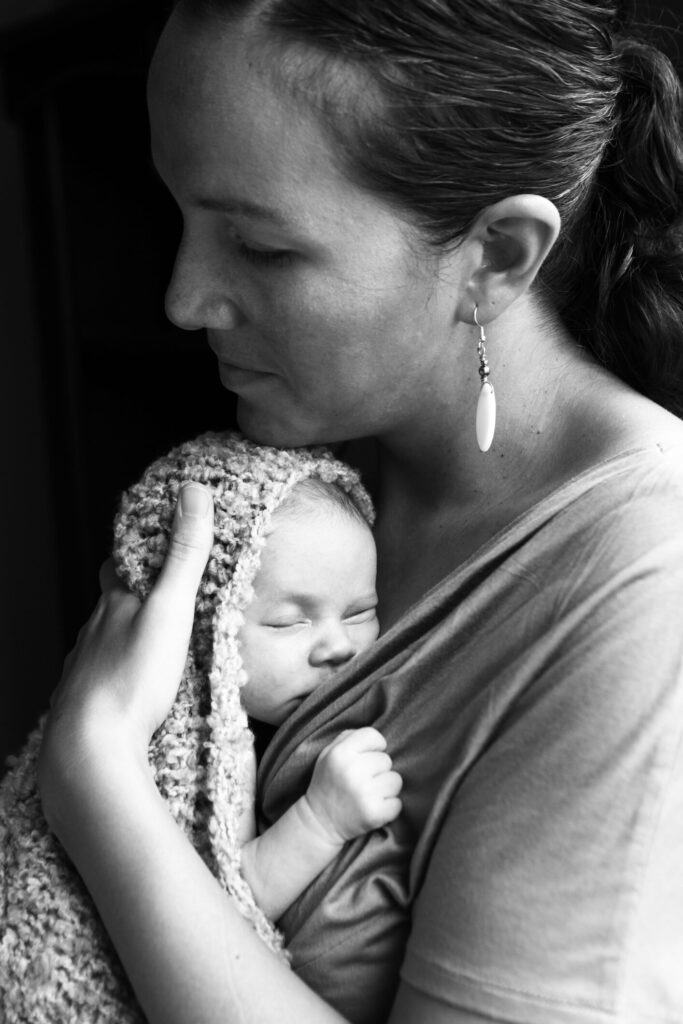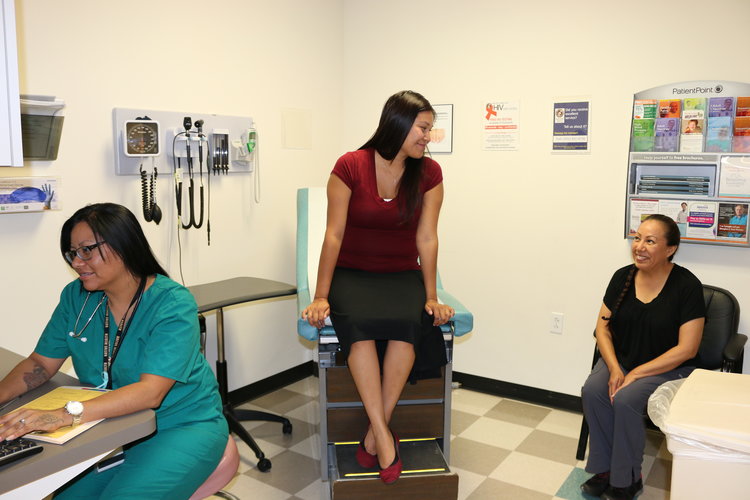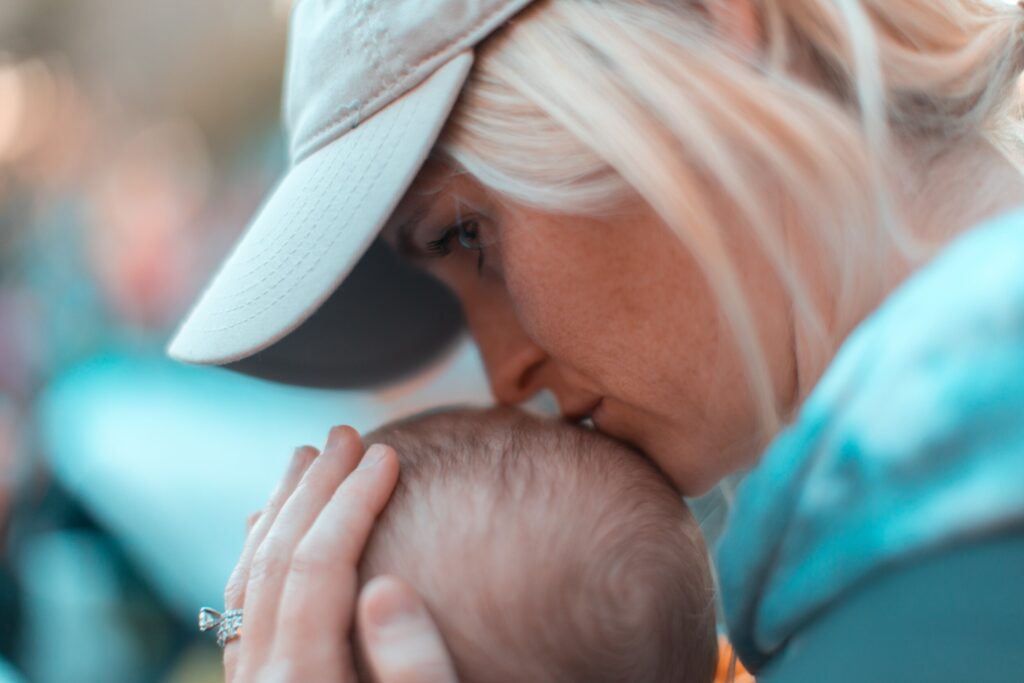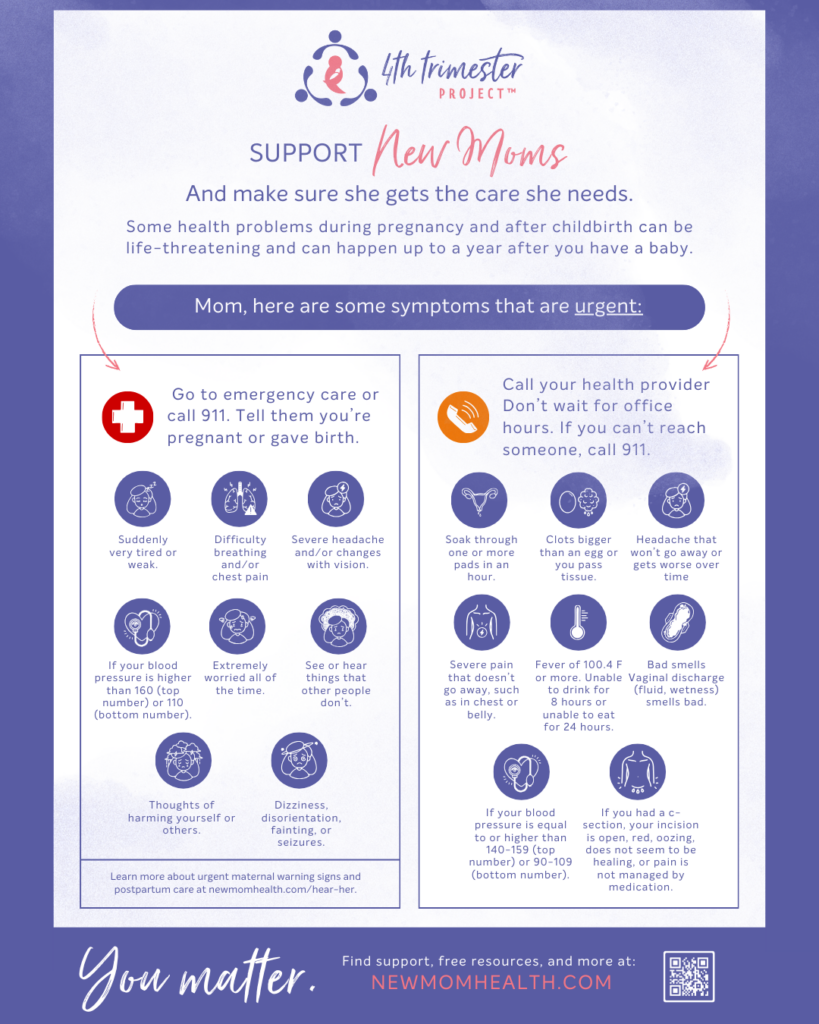
Pregnancy is considered to be a “stress test” for life. This means that health issues in pregnancy, such as gestational diabetes, heart problems, or high blood pressure, mean that there is a greater risk of having these conditions in the future (even if they get better after birth). This can be scary information to consider. The postpartum check-in and screening is particularly important for women with health conditions.
Paying close attention to how you feel and looking out for potentially concerning symptoms and emergencies is important, even with everything else going on. Some maternal health warning signs can happen up to a year after childbirth! Knowing the postpartum recovery red flags could save your life!
Download a one-page postparutm warnings signs info sheet to stick on your refrigerator so people areound you also know the urgent warning signs and concerning symptoms.
The new standard of postpartum care in the US is for women to receive postpartum care when they need it – not waiting for six weeks. Some women need to have their blood pressure checked frequently in the first few weeks after delivery. This is particularly important for women who had preeclampsia-eclampsia, chronic hypertension, gestational hypertension and HELLP Syndrome. The Preeclampsia Foundation has great resources for women who had this condition. They have published a paper on their recommendations for things women can do to reduce their risk of cardiovascular disease (See page 18). Heart health is also important. The Preeclampsia Foundation also has excellent resources about heart self care here.
Screening after birth is important for women who had gestational diabetes. Sugars for women with diabetes that started during pregnancy will likely get better after the baby is born. However, even if sugars are better after birth, all women who had GDM should have a glucose test at their postpartum visit, and then get screening every 1-3 years. Providers aren’t good at remembering to do this and may schedule appointments at times that make it hard to fast. Please speak up and make sure you get what you need. Ask for a morning appointment, don’t eat or drink before the visit, and make sure that the clinic is prepared. Weight loss, exercise, and breastfeeding can reduce the risk of type 2 diabetes. Women deserve nutrition, exercise and lactation support. If you’ve had gestational diabetes, breastfeeding your baby can lower your future risk. The longer a woman breastfeeds, the lower her risk. You can also lower your risk by continuing to eat the kinds of foods that were suggested when you were pregnant, and getting regular exercise .
Women’s health matters – women deserve to live their best life! Healthcare providers are supposed to be there to serve you and connect you with the treatment and support you deserve. When visiting a specialist or going to the emergency department, new moms should be sure to let providers know they have recently had a baby and if they are breastfeeding or expressing milk.
Additional Resources to Explore for Different Conditions:
Urgent Maternal Health Warning Signs – be sure you know, recognize, and know what to do if you suspect something isn’t right – click to review.
Black Women’s Health Imperative Healthy Lifestyle: Managing Conditions
Accreta/Increta/Percreta
- National Accreta Foundation: preventaccreta.org
Amniotic Fluid Embolism
- Amniotic Fluid Embolism Foundation: afesupport.org/get-support
Blood Clot
- National Blood Clot Alliance: www.stoptheclot.org
- Women & Blood Clots: womenandbloodclots.org/resources/
Heart Failure (pregnancy-induced)
- Save the Mommies: https://savethemommies.com/
Postpartum Mental Health and Wellness
- Postpartum Support International has 24/7 anonymous text, chat, and phone support
Postpartum Hemorrhage
- Life after postpartum hemorrhage: https://pqcnc-documents.s3.amazonaws.com/aim/PQCNCOBHPPHDischargeEd20180327.pdf
- March of Dimes: www.marchofdimes.org/pregnancy/postpartum-hemorrhage.aspx
Preeclampsia/Eclampsia/HELLP Syndrome
- Postpartum Hypertension – High blood pressure can develop in the weeks following childbirth, known as postpartum hypertension. This condition requires medical attention, as it can increase the risk of complications such as stroke or heart attack. Be mindful of symptoms such as headaches, blurred vision, or swelling, and contact your healthcare provider if you’re experiencing any concerning signs. Learn more.
- EndPreeclampsia: www.endpreeclampsia.org
- Preeclampsia Foundation: www.preeclampsia.org/get-support
Sepsis
Sepsis Alliance: www.sepsis.org/sepsis-and/pregnancy-and-childbirth/
Diabetes
- American Diabetes Association on Pregnancy / Postpartum
Be sure to review our My Health sections on Pelvic Floor, Breasts, Hormones, and more.
This is not an exhaustive list of potential postpartum medical health conditions. Talk to your provider about previous diagnoses, family history, and anything you think isn’t right. These conditions are often treatable and risks can be prevented!














